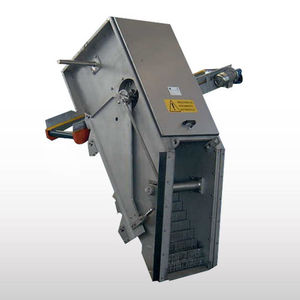
Step Screen in Jaipur

A Step Screen is a type of mechanical fine screen widely used in wastewater treatment plants for preliminary treatment. It consists of a series of overlapping, step-shaped lamella (bars or plates) that move in sequence to transport and remove solid materials from wastewater. The screen operates in a self-cleaning manner, where one row of movable steps lifts the debris and conveys it upwards, while the stationary steps provide a support surface.
The solids are lifted step by step to the discharge point, while the cleaned water passes through the gaps between the bars. This design prevents clogging, reduces manual cleaning requirements, and allows continuous operation. Step screens are particularly effective for fine screening, capturing hair, fibres, and small solid particles.
- Efficient Fine Screening – Captures small solids such as hair, fibres, and plastics with bar spacing typically between 3–6 mm.
- Self-Cleaning Design – Alternate movement of stationary and movable steps lifts screenings upward, preventing clogging.
- Continuous Operation – Works automatically without frequent manual intervention, ensuring uninterrupted screening.
- Low Maintenance – Few moving parts, reduced wear, and no need for external cleaning devices like brushes or sprays.
- High Hydraulic Capacity – Handles large flow rates without causing significant head loss.
- Durability – Made of stainless steel or corrosion-resistant materials, suitable for harsh wastewater environments.
- Compact Design – Requires less installation space compared to some other fine screen types.
- Safe & Hygienic – Fully enclosed option available to reduce odor, aerosol, and spillage.
- Energy Efficient – Consumes less power compared to rotary drum or band screens.
- Easy Solids Handling – Screened material can be discharged directly into conveyors, washers, or compactors.